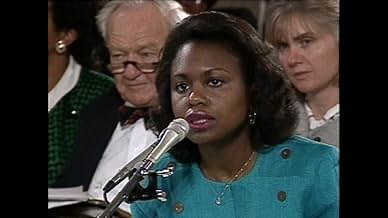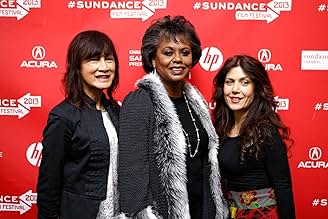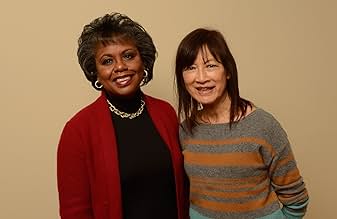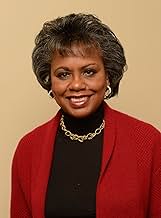IMDb RATING
6.8/10
623
YOUR RATING
A profile of Anita Hill, the African-American lawyer who challenged Clarence Thomas' nomination to the US Supreme Court and thus exposed the problem of sexual harassment to the world.A profile of Anita Hill, the African-American lawyer who challenged Clarence Thomas' nomination to the US Supreme Court and thus exposed the problem of sexual harassment to the world.A profile of Anita Hill, the African-American lawyer who challenged Clarence Thomas' nomination to the US Supreme Court and thus exposed the problem of sexual harassment to the world.
- Awards
- 3 wins & 3 nominations total
Orrin Hatch
- Self
- (archive footage)
Ted Kennedy
- Self
- (archive footage)
Patrick Leahy
- Self
- (archive footage)
Alan Simpson
- Self
- (archive footage)
Arlen Specter
- Self
- (archive footage)
Strom Thurmond
- Self
- (archive footage)
- Director
- Writer
- All cast & crew
- Production, box office & more at IMDbPro
Featured reviews
10athabsca
If you don't remember the Anita Hill story you should see this story. If you remember Anita Hill and the media around the story...you don't really know the story. Speaking truth to power is the sub-title and is the tale of her life story. Amazing how far our country has come since 1991, and how far it still has to go. Anita's bravery in standing up and telling the truth, being a good American and doing the right thing, when she had so much to lose is more than most of us would have the courage to do. From her childhood in Oklahoma, to Yale Law, to DC, and beyond this film by an Oscar Award Winner tells Anita's story beautifully and shows how much she gave up to tell the truth about Clarence Thomas. It's time to open our eyes. See it.
Anita Hill shares her story about the sexual harassment she suffered from her former boss Clarence Thomas to the US Senators in this documentary. Throughout the whole proceedings, it appeared that the senators had been intimidating Mrs. Hill to repeatedly recount the disgusting details in an effort to humiliate and demoralize her, but she remained calm, patient, and determined to express her point. Her claims was not taken seriously, yet even so, I was delighted to know she had a positive influence on others. She might not have believed that voicing the truth would benefit her much, but in reality, it impacted a lot of others who were or are hesitant to speak out against their boss for fear of losing their jobs, having their reputations tarnished or receiving threats.
Unfortunately, this movie tells only one side of the story so it really does not do justice to Anita Hill. I too, watched the proceedings and this movie does not tell it like it really happened. If you want to see a movie that degrades the senate and makes a monster out of Clarence Thomas without even an attempt at fairness or equality, then this is the movie for you. It is so biased that it was only believable by someone who was already convinced of Thomas' guilt. It was so biased that it came across as a work of fiction. As such, it is less than useless for telling the facts.
Its a shame really, this story needs to be told properly. I can only imagine the courage it must have taken to stand before the senate and testify about this kind of thing. As my dad used to say "if you want it screwed up, give it to the government... or Hollywood"
Its a shame really, this story needs to be told properly. I can only imagine the courage it must have taken to stand before the senate and testify about this kind of thing. As my dad used to say "if you want it screwed up, give it to the government... or Hollywood"
Associate Justice of the United States Supreme Court Thurgood Marshall announced his retirement on June 27, 1991. President George Bush nominated Clarence Thomas to fill the vacant seat. Senator Joseph Biden chaired the Senate committee to offer a report to recommend the Senate to consent or not. The process moved smoothly, until someone leaked a letter from Anita Hill. Ms. Hill was a professor at the University of Oklahoma College of Law,where she taught commercial law and contracts. Earlier she had worked at the U. S. Equal Opportunity Commission. There, her boss, Clarence Thomas, she said, sexually harassed her. Biden's committee took her testimony, then shut down without considering other witnesses.
Freida Lee Mock's documentary about Ms Hill starts with that point of history, commencing with a "just the facts" attitude, and gradually comes to Ms. Hill's side. That takes the audience about 45 minutes into the movie. After that, we get a sympathetic half hour of Ms. Hill's roots, the impact of her testimony on her, and her life over the next twenty years.
Today, Clarence Thomas is still an Associate Justice of the Supreme Court. He is still beset by scandal. Joseph Biden is President of the United States. The first subheading on the EEOC website leads to instructions on how to file a charge of discrimination. Ms. Hill teaches at Brandeis University.
Freida Lee Mock's documentary about Ms Hill starts with that point of history, commencing with a "just the facts" attitude, and gradually comes to Ms. Hill's side. That takes the audience about 45 minutes into the movie. After that, we get a sympathetic half hour of Ms. Hill's roots, the impact of her testimony on her, and her life over the next twenty years.
Today, Clarence Thomas is still an Associate Justice of the Supreme Court. He is still beset by scandal. Joseph Biden is President of the United States. The first subheading on the EEOC website leads to instructions on how to file a charge of discrimination. Ms. Hill teaches at Brandeis University.
I vaguely recall the case. The coverage could hardly be missed. But all I really remember -- and what occupied the media so prominently -- was the pubic hair on the soft drink can and the expression "Long Dong Silver." I don't know what was edited out of this film but as it stands it presents a fairly convincing case that Anita Hill was intelligent and honest. She has neither a ghetto nor a Southern accent and, practically speaking, that helps her. And she didn't make public appearances denouncing Thomas. The "harassment" was uncovered in the course of a routine FBI examination and she was called to testify.
Clarence Thomas speaks without a regional accent too but his statements are far more forceful and inflammatory than hers. He denies outright that any such exchanges took place. And, unlike Hill, he "plays the race card," as they say. "This is a high tech lynching." I hate that phrase, but that's what he does. It's a trump card. It frightens people and they back off. It changes the structure of the inquiry from the work harassment of Anita Hill to a racist attack on Clarence Thomas.
Nobody kisses Anita Hill's ring and some of the questions sound not only adversarial but actually hostile. "Why did you wait so long to bring this up?", is a reasonable enough query. But, "Do you see yourself as a symbol of black womanhood and liberation?", is a bit much. So is, "Do you like the attention you're getting?" So is, "Are you a woman scorned?" Of course her answer will be "no," but it's the kind of question that gives the anti-Hill folks a handle to hang their dismissal on.
She volunteered to take a polygraph test and passed. Four female witnesses supporting Hill waited in the wings to be called but were ignored. Female witnesses were called on Thomas' behalf. The judgment of the Judiciary Committee as to his being qualified were split, 7 to 7, and the nomination was sent to the Senate without any recommendation, which was rare.
After the questionable exchanges and requests for dates, she accompanied Thomas to his next job and spent another two years working for him. She claims that it was in a field she wanted to work in, the exchanges had apparently ended, and she didn't have a job waiting anywhere else.
Frankly, I don't care much about Thomas' having made some questionable remarks to her. A lot of men are raunchy and some raunchy men are clumsy in their jokes with women.
But that exchange -- the one that people like me remember -- is a minor point. The attacks on Anita Hill continued after the investigation was closed. Thomas went on to become a Supreme Court Justice. Hill wound up at Oral Roberts University. Hill had become a tenured professor. Moves were made, according to her, to get her fired. When that didn't work, the Dean of the university began receiving threats. Years later, the wife of Clarence Thomas left a voice mail message for Hill, asking that Hill apologize for her testimony. Hill turned it over to the FBI who found it authentic.
The impression left with the viewer is that the committee were anxious to discredit her, close the investigation quickly, and end the publicity. What actually went on between the two is unknowable.
In my judgment, I don't find myself sobbing because of Anita Hill's mistreatment. If that's the worst problem one has at work -- a boss joking about pubic hair and asking you for dates -- it's not much of a problem. We've all had much worse. But Clarence Thomas has turned out to be a complete nonentity. He votes reliably in a predictable way and years passed without his ever asking a question from the bench. (That's not in itself a bad sign but it leaves us blind to his reasoning.
Her academic career has been an unqualified success. After graduating as valedictorian from Morris High School, Hill enrolled at Oklahoma State University, receiving a bachelor's degree with honors, in psychology 1977. She went on to Yale Law School, obtaining her Juris Doctor degree with honors in 1980. After her penal servitude at Oral Roberts, she taught at Berkeley and is now at Brandeis University. Thomas' education is equally impressive.
The film presents her as a heroine of epic stature, a sacrificial victim almost, in a patriarchal and conservative society. I don't. I see her as another woman who was addressed in questionable ways by a boss and testified about it without being anxious to do so. Personally I wish her testimony had had more impact. Thomas was a fan of Ayn Rand, which I'm not.
Clarence Thomas speaks without a regional accent too but his statements are far more forceful and inflammatory than hers. He denies outright that any such exchanges took place. And, unlike Hill, he "plays the race card," as they say. "This is a high tech lynching." I hate that phrase, but that's what he does. It's a trump card. It frightens people and they back off. It changes the structure of the inquiry from the work harassment of Anita Hill to a racist attack on Clarence Thomas.
Nobody kisses Anita Hill's ring and some of the questions sound not only adversarial but actually hostile. "Why did you wait so long to bring this up?", is a reasonable enough query. But, "Do you see yourself as a symbol of black womanhood and liberation?", is a bit much. So is, "Do you like the attention you're getting?" So is, "Are you a woman scorned?" Of course her answer will be "no," but it's the kind of question that gives the anti-Hill folks a handle to hang their dismissal on.
She volunteered to take a polygraph test and passed. Four female witnesses supporting Hill waited in the wings to be called but were ignored. Female witnesses were called on Thomas' behalf. The judgment of the Judiciary Committee as to his being qualified were split, 7 to 7, and the nomination was sent to the Senate without any recommendation, which was rare.
After the questionable exchanges and requests for dates, she accompanied Thomas to his next job and spent another two years working for him. She claims that it was in a field she wanted to work in, the exchanges had apparently ended, and she didn't have a job waiting anywhere else.
Frankly, I don't care much about Thomas' having made some questionable remarks to her. A lot of men are raunchy and some raunchy men are clumsy in their jokes with women.
But that exchange -- the one that people like me remember -- is a minor point. The attacks on Anita Hill continued after the investigation was closed. Thomas went on to become a Supreme Court Justice. Hill wound up at Oral Roberts University. Hill had become a tenured professor. Moves were made, according to her, to get her fired. When that didn't work, the Dean of the university began receiving threats. Years later, the wife of Clarence Thomas left a voice mail message for Hill, asking that Hill apologize for her testimony. Hill turned it over to the FBI who found it authentic.
The impression left with the viewer is that the committee were anxious to discredit her, close the investigation quickly, and end the publicity. What actually went on between the two is unknowable.
In my judgment, I don't find myself sobbing because of Anita Hill's mistreatment. If that's the worst problem one has at work -- a boss joking about pubic hair and asking you for dates -- it's not much of a problem. We've all had much worse. But Clarence Thomas has turned out to be a complete nonentity. He votes reliably in a predictable way and years passed without his ever asking a question from the bench. (That's not in itself a bad sign but it leaves us blind to his reasoning.
Her academic career has been an unqualified success. After graduating as valedictorian from Morris High School, Hill enrolled at Oklahoma State University, receiving a bachelor's degree with honors, in psychology 1977. She went on to Yale Law School, obtaining her Juris Doctor degree with honors in 1980. After her penal servitude at Oral Roberts, she taught at Berkeley and is now at Brandeis University. Thomas' education is equally impressive.
The film presents her as a heroine of epic stature, a sacrificial victim almost, in a patriarchal and conservative society. I don't. I see her as another woman who was addressed in questionable ways by a boss and testified about it without being anxious to do so. Personally I wish her testimony had had more impact. Thomas was a fan of Ayn Rand, which I'm not.
Details
- Release date
- Country of origin
- Official site
- Language
- Also known as
- Anita
- See more company credits at IMDbPro
Box office
- Gross US & Canada
- $176,979
- Opening weekend US & Canada
- $44,114
- Mar 23, 2014
- Gross worldwide
- $176,979
- Runtime
- 1h 16m(76 min)
- Color
- Aspect ratio
- 1.78 : 1
Contribute to this page
Suggest an edit or add missing content


































